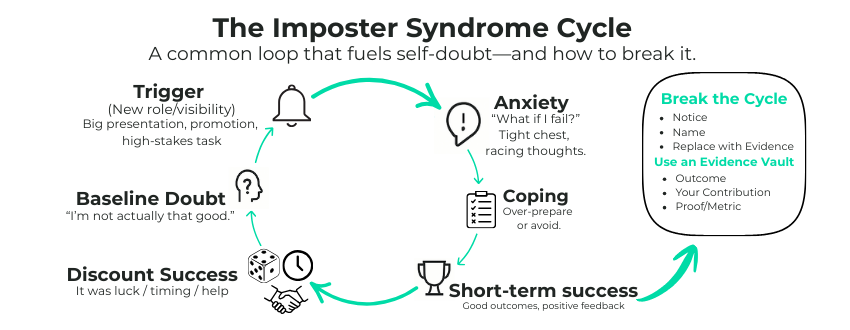Overcoming Imposter Syndrome: How High-Achieving Women Can Own Their Brilliance

For many accomplished women, a persistent inner voice insists they haven’t truly earned their success. This nagging self-doubt – often known as overcoming imposter syndrome – can make even the most capable individuals feel like frauds. As a male ally and mentor, I’ve seen firsthand how brilliant women sometimes underestimate their own worth.
In this guide, we’ll explore why overcoming imposter syndrome is so crucial among high-achieving women and how to fully own your brilliance and gain the recognition you deserve. With the right strategies and support – including from mentors and allies – you can silence your inner critic, step into your full leadership potential, and lead on your terms. If that inner voice is loud, start here: practical impostor‑syndrome strategies to quiet your inner critic
This guide builds on insights from my upcoming book, Power Without Permission, which shares real stories and practical tools to quiet impostor syndrome, own your brilliance, and lead on your terms. If you’re looking for an ongoing support network and peer practice, explore our LeadersAdapt community as well.
What Is Imposter Syndrome and Why Overcoming Imposter Syndrome Matters
Overcoming imposter syndrome starts with understanding what it is. Imposter syndrome is the pervasive feeling of self-doubt and incompetence that persists despite evident success. People who experience it believe they’re undeserving of their achievements – convinced they’ve only succeeded due to luck, timing, or other external factors – and fear they’ll be exposed as a “fraud”.
Ironically, those most likely to struggle with imposter feelings are often high achievers. They may have a track record of excellence – degrees, promotions, accolades – yet still feel out of place in their success.
The Research Behind Imposter Syndrome
The term “Impostor Phenomenon” was first coined in 1978 by psychologists Pauline Clance and Suzanne Imes in a study of high-achieving women, and subsequent research confirmed that while anyone can experience imposter syndrome, it is especially common among women (particularly women of color). You’re not alone 75% of women execs share three real impostor‑syndrome stories
Overcoming imposter syndrome is crucial because it’s incredibly widespread. Some estimates suggest around 70% of people will experience imposter syndrome at least once in their life. Even more striking, roughly 25–30% of high-achievers may chronically struggle with these feelings.
How Imposter Syndrome Manifests Professionally
In professional environments, overcoming imposter syndrome becomes essential as this often translates to women (and men) questioning whether they’re “good enough” for their roles, attributing their successes to being in the right place at the right time rather than their own talents. For a deeper breakdown of day‑to‑day patterns—and quick fixes—see our guide to impostor syndrome at work

Why High-Achieving Women Struggle with Overcoming Imposter Syndrome
If imposter syndrome affects all kinds of people, why does overcoming imposter syndrome hit high-achieving women so hard? Several factors – both internal and external – make women more susceptible to feeling like they don’t belong at the top:
Perfectionism and Social Conditioning Impact
Women are often socially conditioned to seek perfection and not overstep norms. From a young age, many girls learn to avoid mistakes and not appear “bossy.” By adulthood, this can manifest as perfectionism and fear of failure – fertile ground for imposter feelings.
Those who experience imposter syndrome often grapple with perfectionism and difficulty internalizing success. A high-achieving woman might assume she needs to know everything and do everything flawlessly to truly deserve her position. Any small shortcoming becomes “proof” in her mind that she isn’t qualified after all.
Attribution Bias: Undervaluing Professional Achievements
Overcoming imposter syndrome requires addressing attribution bias. Imposter syndrome drives women to downplay their accomplishments. Rather than owning their expertise, they might credit external causes like luck, extra help, or timing for their success.
For example, a woman leader might think “I got that promotion because my boss likes me,” instead of acknowledging “I earned that promotion because I was the top performer.” Over time, this attribution bias reinforces self-doubt – she sees her achievements as flukes, not evidence of her capability.
Being the Minority in Leadership Rooms
In many industries, women – especially in leadership – remain underrepresented. Walking into a boardroom where most executives are men can exacerbate feelings of not belonging.
According to McKinsey’s Women in the Workplace report, despite women making up about 46% of entry-level employees globally, they hold less than 25% of C-suite leadership roles. Managers and peers can change the room quickly, try these male‑allyship scripts that move the needle.
Knowing that women are a minority at the top can create added pressure to prove oneself, and any stumble may feel like validation of negative stereotypes. This external environment can trigger or worsen imposter feelings (“Maybe they’re right, maybe I don’t fit here”).
Gender Stereotypes and Professional Bias
High-achieving women often battle subtle (or not-so-subtle) biases that can chip away at confidence. If a woman’s ideas are overlooked in meetings or she’s passed up for promotions in favor of less-qualified male colleagues, she may internalize those experiences and wonder if she truly is less capable.
Over years, systemic bias can turn into internalized doubt. (Ever heard of the “overlooked overachiever”? Many women deliver outstanding results yet get underestimated or dismissed, which can make anyone question their value.)
The “100% Ready” Barrier to Opportunities
One well-known indicator of women’s self-doubt is how they approach new opportunities. A Harvard Business Review report found that men will apply for a job when they meet ~60% of the qualifications, whereas women tend to only apply if they meet 100%. If that sounds familiar, work through this 30‑day early‑career confidence guide.
In other words, many women underestimate their readiness and over-qualify themselves out of opportunities – a clear sign of imposter thinking. That dream role or big project might pass by simply because a talented woman assumes she’s not perfectly prepared (while a less qualified man throws his hat in the ring with confidence). This behavior, rooted in the fear of not being “good enough,” holds back countless capable women from advancing. A great first step is this broken rung’ first‑promotion guide that gets you into your first leadership role sooner.
All of these factors create a perfect storm: even women with stellar accomplishments may feel like they’re faking it and fear the day everyone “finds out.” It’s important to realize these feelings are common, not a personal failing. Recognizing why overcoming imposter syndrome is necessary happens is the first step to dismantling it.

The Career Impact: Why Overcoming Imposter Syndrome Is Essential
Overcoming imposter syndrome is not just an internal inconvenience – it can tangibly hinder a woman’s career growth and personal well-being. Here are some of the detrimental effects when these doubts go unchecked:
How Imposter Syndrome Stalls Career Progression
As noted above, self-doubting women may hold themselves back from pursuing promotions, leadership roles, or challenging assignments unless they feel 110% confident. This hesitation means they miss chances to advance or showcase their full potential. When you’re ready to step up, this promotion playbook for women gives you the language and scripts to make the ask.
Over time, colleagues with more self-confidence (even if not more talent) climb ahead. The company also misses out on what these women could contribute in higher positions. In a broader sense, when many women opt out of advancement due to imposter feelings, it contributes to the persistent gender gap in leadership ranks.
The Overwork and Burnout Cycle
Paradoxically, overcoming imposter syndrome becomes crucial because imposter syndrome can drive women to work extremely hard to compensate for feeling “less capable.” They may strive to over-prepare and over-deliver on every task out of fear that one slip-up will expose them.
While a strong work ethic is positive, overworking from a place of anxiety is not sustainable. This constant pressure and inability to delegate or say no can lead to stress, burnout, and health impacts. The joy and balance in work fade when you’re endlessly trying to prove you’re “enough.”
Reduced Confidence and Professional Visibility
Imposter feelings often cause women to shy away from the spotlight. They might avoid speaking up in meetings or hesitate to share innovative ideas, worrying their input isn’t valuable. They may also refrain from networking or self-promotion. To turn visibility into momentum, use these leadership development tactics for women.
The result? They become less visible to peers and higher-ups, which can reinforce a lack of recognition. It’s a vicious cycle: feeling like a fraud leads to staying quiet, which leads others to possibly overlook you, which then reinforces feeling like you don’t matter. Then run this to raise your voice, your asks, and your impact this quarter.
The Emotional and Mental Health Toll
Constantly battling thoughts of inadequacy is exhausting. Overcoming imposter syndrome matters because imposter syndrome is linked with feelings of anxiety, depression, and low self-esteem. It’s hard to celebrate your successes – or sometimes even get a good night’s sleep – when your mind is busy replaying doubts like “I’m not actually qualified for this” or “I don’t deserve to be here.”
This can erode overall quality of life and happiness at work. Everyone has moments of doubt, but imposter syndrome turns it into a chronic shadow over achievements that should rightly be enjoyed.
Organizational Impact of Unaddressed Imposter Syndrome
On a larger scale, if a workplace is full of talented women holding back, the organization loses out. Research from Boston Consulting Group has shown that diverse leadership leads to more innovation and smarter decision-making.
When imposter syndrome keeps women from ascending to or performing confidently in leadership roles, companies miss the benefit of their ideas and perspectives. Moreover, the culture suffers – younger women see fewer role models, and the cycle can continue. It’s in everyone’s interest to tackle overcoming imposter syndrome so that leadership teams can truly include the best talent (of all genders).
The bottom line: Overcoming imposter syndrome doesn’t just live in your head; it can stall careers, harm mental health, and contribute to gender gaps in the workplace. The good news is that once you name it and understand its tricks, you can start taking action to curb its influence. Next, we’ll dive into concrete strategies to push past impostorism and reclaim your confidence.

Proven Strategies for Overcoming Imposter Syndrome and Self-Doubt
Overcoming imposter syndrome is absolutely possible. It won’t typically disappear overnight – after all, these thought patterns may have built up over years – but with consistent practice, you can retrain your brain to think differently. Below are several research-backed strategies and practical tips to help quiet that inner impostor voice and boost your confidence:
1. Acknowledge Your Achievements – Trust Your Track Record
Start by grounding yourself in facts over feelings. When self-doubt creeps in, deliberately acknowledge and review your accomplishments. High-achieving women struggling with overcoming imposter syndrome often minimize their successes, so this step is critical.
Keep a “Brag Sheet” or Achievement Journal
Document your wins, big and small – projects you led, goals you hit, praise from clients or bosses, awards earned, challenges overcome. Regularly update this list. When imposter feelings flare up, read through that list. It’s concrete evidence of your abilities and hard work. Reminding yourself of tangible achievements helps counter the false narrative that you’re “not that good.”
Own the Outcome of Your Success
For each accomplishment, consciously attribute it to your skills, effort, and perseverance. For example, if you delivered a successful product launch, don’t credit just luck or team help. Recognize your role: “I organized the team effectively and my strategy led to 20% higher sales.”
This isn’t bragging – it’s stating facts. Over time, this practice trains you to internalize success rather than deflect it.
Leverage Proof, Not Perfection
Aim to draw confidence from proven results instead of an impossible standard of perfection. Maybe you didn’t execute a task flawlessly, but perhaps the client was happy and the objectives were met. That is proof of success.
Learn from any mistakes, certainly, but don’t invalidate the overall outcome. As I share in Power Without Permission, use proof, not perfection, to lead with confidence. By trusting the results you’ve already delivered (your track record), you build a more solid self-image grounded in reality.
(Remember: Acknowledging your achievements is not arrogance – it’s resilience. Whenever impostor feelings say “You’re not good enough,” respond with evidence: “Actually, I succeeded in A, B, and C, which shows I am capable.” Over time, the inner critic’s voice will weaken in the face of undeniable facts about your competence.)
2. Reframe Your Self-Talk for Overcoming Imposter Syndrome
Overcoming imposter syndrome lives in our thought patterns. Thus, a powerful way to combat it is by actively reshaping your self-talk. Essentially, you want to catch yourself in those moments of negative self-judgment and flip the script:
Identify Imposter Thoughts Patterns
Start paying attention to the specific thoughts that run through your mind in stressful or success moments. Common ones include: “I have no idea what I’m doing,” “I’m just faking it,” “Soon everyone will realize I’m not as smart as they think,” etc.
Write them down. Simply noticing these thoughts kicks off the process of challenging them.
Challenge and Correct the Narrative
For each imposter thought, respond with a more rational, positive statement. Treat it like you’re fact-checking an incorrect statement. For example, when you think “I only got invited to speak at this conference because they felt sorry for me,” immediately counter with something like, “I was invited because I have valuable expertise – I have 10 years of experience in this field and a unique perspective to share.”
If the thought is “I’m not qualified to lead this project,” counter it with “My boss assigned me this project because she trusts my skills. I’ve led similar successful projects before.” By refuting lies with truth, you gradually rewire your mindset.
Replace Perfectionism with Learning
Overcoming imposter syndrome often makes us fear anything less than perfect. Practice telling yourself it’s okay to not know everything or to make a mistake – that doesn’t make you a fraud, it makes you human.
Instead of thinking “If I don’t execute this perfectly, I’m a failure,” reframe it to “I will do my best, and if I stumble, I’ll learn from it. My worth is not defined by one meeting or one report.” This growth mindset perspective takes power away from imposter syndrome. Remember, even the most successful people have moments of uncertainty and every expert was once a beginner. Instead of “fake it till you make it,” build authentic confidence as a female leader that lasts.
Use Affirmations for Overcoming Imposter Syndrome
It might feel cheesy at first, but positive affirmations can help override impostor feelings. Phrases like “I am knowledgeable and prepared,” “I deserve my success,” “My contributions are valuable” said regularly (especially when overcoming imposter syndrome feelings spike) can reinforce self-belief.
Some women find it helpful to keep these written on sticky notes at their desk as daily reminders.
By consciously shifting your internal dialogue, you reduce the hold of overcoming imposter syndrome. Over time, you’ll find the negative thoughts popping up less frequently, and when they do, you’ll be well-practiced at shutting them down or simply letting them pass without believing them. Your inner voice can become more of a coach than a critic – pushing you forward instead of holding you back.
3. Seek Support and Mentorship for Overcoming Imposter Syndrome
It’s important to realize that you don’t have to overcome imposter feelings in isolation. Seeking support – whether through peers, mentors, coaches, or professional networks – can accelerate your journey to confidence:
Find a Trustworthy Mentor or Coach
A good mentor (male or female) can provide perspective, advice, and encouragement. Often, a mentor will share that they too have felt overcoming imposter syndrome at times. Just hearing a successful role model admit to similar doubts can be incredibly validating – you realize these feelings are common and can be overcome.
A mentor can also help reality-check your self-assessments. For instance, when you feel “I bombed that presentation,” a mentor might point out positive feedback you received or remind you of the overall impact you made. This outside perspective balances the distorted self-critique overcoming imposter syndrome creates.
Join Women’s Networks for Overcoming Imposter Syndrome
Many organizations have women’s leadership groups or support circles where colleagues share experiences and uplift each other. Consider joining one. Discussing challenges in a safe space breaks the secrecy and shame that fuel imposter feelings.
You’ll likely hear others voice exactly the doubts you have, which helps normalize them. Together, you can trade strategies on overcoming imposter syndrome and celebrate each other’s wins. Knowing a circle of peers “has your back” boosts confidence tremendously.
If you want a curated, leadership‑focused space, consider our LeadersAdapt community for ongoing practice, accountability, and peer support.
Open Up to Trusted Colleagues
If you have a coworker or friend at work you trust, let them know you sometimes struggle with self-doubt. Chances are, they will empathize and perhaps share their own challenges. This candor can strengthen your support system.
Plus, trusted colleagues can give you a nudge when you need it – for example, encouraging you to apply for that promotion or speaking up in a meeting to reinforce your idea, showing they value your input.
Professional Help for Overcoming Imposter Syndrome
If overcoming imposter syndrome is deeply affecting your mental health or career, there’s no shame in seeking a therapist or career coach with experience in this area. They can provide tools (like cognitive-behavioral techniques) tailored to your situation.
Sometimes a few sessions can unlock a breakthrough in how you handle self-doubt.
Remember: Overcoming imposter syndrome thrives in isolation. The moment you share what you’re feeling with someone supportive, the spell often begins to break. You realize “It’s not just me” and gain feedback that your imposter thoughts are not reality. So, build a team of allies around you. As the African proverb says, “If you want to go fast, go alone. If you want to go far, go together.” Going together makes overcoming imposter syndrome much easier.
4. Celebrate Your Strengths for Overcoming Imposter Syndrome
High-achieving women with overcoming imposter syndrome often have a habit of brushing off their successes. Going forward, make a point to do the opposite: actively celebrate your victories and embrace compliments. This isn’t about ego – it’s about reinforcing neural pathways that say “Yes, I am competent and I can succeed.” Some tips to practice this:
Accept Compliments Gracefully
The next time someone praises your work or congratulates you, fight the urge to say something like “Oh, it was nothing” or “I got lucky.” These dismissive replies undermine you and feed imposter feelings. Instead, say “Thank you” and mean it.
Internalize that praise for a moment. You might even add a confident acknowledgement, like, “Thank you – I worked very hard on that project, and I’m happy it achieved good results.” This might feel uncomfortable initially, but it gets easier. By accepting praise, you validate your abilities to yourself.
Savor Achievements Before Moving to Next Goals
It’s common for ambitious individuals to leap to the next goal without pausing. Make it a habit to pause and celebrate when you accomplish something important. Finished a big project? Treat yourself to something enjoyable or share the news with a friend who will celebrate with you.
Got a positive performance review? Take pride in it – maybe even write down what you’re proud of from that review. These moments of celebration create positive reinforcement that fuels future confidence. You deserve to enjoy the fruits of your labor.
Identify Your Core Strengths
Spend time reflecting on what you know you’re good at – and don’t limit it to technical skills. Maybe you excel at solving complex problems, or you’re a great listener, or you have a talent for building client relationships.
Name those strengths and find opportunities to use them even more in your work. When you operate in your areas of strength, you feel more in your element and less likely to feel like an impostor. It also becomes easier to respond to self-doubt with “Actually, I do bring a lot to the table – for example, I’m very good at X and Y, and I’ve proven that.”
Stop Comparing for Overcoming Imposter Syndrome
Overcoming imposter syndrome flares when we constantly compare ourselves to others – an easy trap for high achievers. You might be comparing your journey to a colleague who seems to have it all together. But remember, you often only see others’ highlight reels, not their struggles.
Commit to focusing on your own progress and growth. As Psychology Today notes, stay focused on measuring your own achievements instead of comparing yourself to others. Celebrate the distance you’ve covered in your unique journey. This mindset shift helps you derive self-worth internally (based on how you improve) rather than externally (against how someone else is doing).
By making these behaviors part of your routine, you train yourself to embrace success proudly instead of fearing it. Each time you genuinely celebrate a win or accept a compliment, overcoming imposter syndrome loses some grip. Over time, you build an identity as a capable, successful person who deserves every bit of success that comes your way – because you do!
5. Push Yourself Out of the Comfort Zone
One cruel aspect of overcoming imposter syndrome is that it can act like a fence keeping you in your comfort zone. To break free, make a conscious effort to step into new challenges despite the self-doubt. Think of it as an experiment in proving your inner impostor wrong:
Say “Yes” to Opportunities for Growth
Did someone suggest you lead a new initiative, present at a conference, or take on a stretch assignment? If it excites you and scares you, that’s a sign it could spur growth. Practice saying “Yes, I’ll do it,” even if your inner voice is whispering you might not be ready.
As noted earlier, don’t wait to feel 100% confident or qualified – if you meet a good portion of the requirements or have the drive to learn the rest, go for it. You will surprise yourself with how well you can rise to the occasion. And each time you do, that’s one more data point disproving your impostor fears.
Adopt a Learning Mindset for New Challenges
When tackling something outside your comfort zone, remind yourself that it’s okay to learn as you go. You don’t need to be an expert from day one. For instance, if you got promoted to a management role and you feel out of depth, seek out resources (books, courses, mentors) to build your skills on the job.
Everyone has a learning curve. Approach the challenge with curiosity – “What skills can I develop here? How will this make me better?” – rather than with dread. This takes pressure off needing to be perfect immediately.
Collect “Proof” of Growth
After pushing yourself to do something scary, take stock of what you did well and what you learned. Maybe you did flub a bit in that presentation, but you handled the Q&A expertly. Or perhaps leading a team was rocky at first, but three months in you have the highest engagement scores.
Write these down. Over time, you’ll have a collection of instances where you did things you once weren’t sure you could do. It’s hard for the impostor voice to argue with a full page of “Things I’ve accomplished that I initially doubted I could.”
Set Realistic Standards for Overcoming Imposter Syndrome
Pushing your limits doesn’t mean setting yourself up to fail with unrealistic expectations. Continue to strive for excellence, but allow yourself a learning curve. For example, if you take on a project in a new domain, aim to deliver a solid result, not necessarily a world-changing masterpiece on the first try.
When you inevitably face hurdles or need to ask questions, remember that needing help or time to improve doesn’t mean you’re a fraud – it means you’re growing.
Stepping out of your comfort zone is one of the fastest ways to build genuine confidence. Yes, it feels risky, but the rewards are immense. Each new experience widens your comfort zone and shrinks your overcoming imposter syndrome. Over time, situations that once would have sent your self-doubt into overdrive will feel well within your capability. You don’t overcome imposter syndrome by playing small – you overcome it by playing big and proving to yourself you can.

Owning Your Brilliance: Gaining Recognition While Overcoming Imposter Syndrome
Beyond quieting the negative voices in your head, it’s important for high-achieving women to actively claim their value and visibility in the workplace. In other words, own your brilliance and make sure it’s recognized. This isn’t self-aggrandizement; it’s about getting due credit for your contributions and ensuring your work doesn’t fly under the radar. Here are some ways to step into the light and get the recognition you deserve:
Stop Waiting for Permission
A recurring theme among many women is the inclination to “wait to be noticed” or wait for opportunities to be offered rather than proactively grabbing them. It’s time to shed that conditioning. Don’t wait for someone to invite you to the table – bring your own chair.
If you have ideas, voice them. If you want a promotion, express your interest to your manager and ask what it takes to get there. Take initiative on projects that align with your strengths. By showing ownership over your career, you position yourself as a leader. Remember, Power Without Permission – you don’t need an external green light to step up; back yourself.
Speak Up About Your Achievements
This can feel uncomfortable, especially if you’ve been taught to be modest, but it’s crucial for overcoming imposter syndrome. In meetings or updates, make sure to highlight successes that you contributed to. For example, instead of saying “Our team did well on the client campaign,” you can say “The strategy I developed for the client campaign helped increase engagement by 50%.”
This isn’t bragging; it’s stating a fact about your work. In one-on-one meetings or performance reviews, come prepared to discuss your achievements and their impact. If you find it hard, revert to your achievement journal for reference. The goal is that key stakeholders know what you’ve accomplished – don’t assume it’s obvious or that someone else will broadcast it for you.
Harness the Power of Networking
Building a strong professional network helps ensure your work and talents are recognized beyond your immediate circle. Attend industry events, join professional associations, and connect with leaders in your field.
When you form genuine relationships, you’ll find people naturally think of you for opportunities or amplify your name in rooms you haven’t entered yet. Networking also provides more avenues to share your expertise (presenting at an event, co-authoring an article, etc.), which raises your profile.
Importantly, internal networking in your company is just as vital – cultivate relationships across departments and at different levels. Visibility within your organization can lead to being tapped for high-profile projects or roles.
Find Sponsors and Advocates
A sponsor is someone in your organization who will advocate for your advancement – recommending you for promotions or key assignments. Often these are senior leaders. How to get one? Perform excellently and make your ambitions known. Sometimes a mentor can turn into a sponsor.
Also, don’t overlook male allies in high places who can use their influence to champion you. Sponsors can make a huge difference in converting your hard work into tangible career moves by ensuring decision-makers see your brilliance. If your workplace has formal programs that connect women with sponsors, take advantage of them.
Correct Credit-Stealing While Overcoming Imposter Syndrome
Unfortunately, many women have faced situations where they propose an idea and it’s ignored until a man repeats it, or they do behind-the-scenes work and someone else gets the accolades. When this happens, assert yourself tactfully.
For example, if a colleague repeats your idea without credit, you might chime in, “Thank you for building on my point, [Name]. To elaborate on what I was saying earlier, …” This reaffirms ownership of the idea. If someone else tries to claim credit for your work, politely clarify your contribution: “Actually, I led that initiative, and X assisted on the execution.”
It might feel forward, but it sets the record straight. Over time, people learn that you won’t allow your work to be marginalized.
Project Confidence Through Body Language
Sometimes how you present yourself can influence perception of your competence. Small tweaks can ensure your brilliance shines through. Stand tall, make eye contact, and use a firm tone when speaking.
Avoid undermining language like “I’m not an expert but –” or “This might be a silly idea –” which undercuts your message. Practice stating your opinions and ideas with confidence. Even if you have to fake it till you make it, adopting confident mannerisms can actually boost your internal confidence (thank you, psychology!). When you appear confident and capable, others are more likely to acknowledge you as such.
By implementing these practices, you essentially act as your own advocate and leader. Overcoming imposter syndrome might have once made you hesitant to step into the spotlight, but now you’re intentionally shining that spotlight on yourself – and rightly so. Owning your brilliance means you’re not shy about the value you bring. This not only helps you advance and get the credit you’re due, but it also chips away at imposter feelings (because the external recognition will begin to affirm the truth that you are highly capable).
Finally, remember to also lift others up as you rise. Recognize and credit your colleagues (especially other women) for their ideas and work. Creating a culture of mutual recognition and support ensures that everyone’s brilliance is seen and appreciated, not just those who shout the loudest.

How Male Allies Support Overcoming Imposter Syndrome
No discussion of women overcoming barriers would be complete without addressing the role of male allies. In workplaces, men often still hold a majority of leadership positions and can be powerful partners in championing women’s advancement. As a male ally myself, I believe men have a responsibility and an opportunity to help change the system and uplift their female colleagues. This benefits not only those women, but the organization and society as a whole.
Understanding Male Allyship
First, what is a male ally? It’s simply a man who actively works with and for women to promote gender equity, both at work and in life. A great definition from WomenLift Health states: “Male allies are men who work with women to promote gender equality… They play a vital role in addressing unconscious biases, challenging harmful stereotypes, and advocating for policies that empower women to lead.”
In practice, being an ally means not just supporting women privately, but using your influence to actively champion women publicly.
Concrete Ways Male Allies Can Help
Here are concrete ways male allies can support women in overcoming imposter syndrome and achieving their potential:
Challenge Stereotypes and Bias
Allies call out biased statements or behaviors when they see them. For example, if someone dismisses a woman’s idea in a meeting, an ally can interject to reinforce the idea and credit the woman who proposed it. If promotions in a company consistently favor men without merit reasons, an ally voices concern and pushes for fair criteria.
It’s about not staying silent in the face of everyday sexism. By speaking up, men set a tone that disrespect or marginalization won’t be tolerated. This helps create an environment where women feel safer and more confident contributing (because they know someone has their back).
Give Credit Where It’s Due
One very practical ally behavior is ensuring women get recognition for their contributions. In meetings, amplify women’s voices: “I think [Jane’s] point is excellent because…” or if you notice a woman’s idea was glossed over, bring it back: “Can we circle back to the idea [Jane] mentioned? It’s worth exploring.”
If you’re a manager, publicize the accomplishments of the women on your team – in email newsletters, team meetings, performance reports, etc. This counters any impostor feelings by showing women that others see and value their work. It also signals to everyone that women’s contributions are celebrated, period.
Mentor and Sponsor Women
Men in leadership can choose to mentor high-potential women and actively open doors for them. As a mentor, a male ally can share advice on navigating the career ladder, provide feedback, and serve as a sounding board – all while empathizing (and educating himself) about the unique challenges women may face.
As a sponsor, an ally can recommend women for stretch assignments or leadership roles, and advocate during promotion discussions. This direct investment in women’s growth can significantly accelerate a woman’s career and boost her confidence.
Educate Yourself on Gender Barriers
Allies take time to learn about the challenges women experience, from wage gaps to microaggressions to the extra scrutiny women leaders often face. Read articles or books on gender bias, attend diversity and inclusion trainings, listen to women colleagues about their experiences without defensiveness.
The goal is to deeply understand the systemic issues and daily hurdles – such as overcoming imposter syndrome triggers – so you can empathize and act thoughtfully. The more aware you are, the better you can spot opportunities to intervene or improve the system.
Advocate for Inclusive Policies
Allies can use their influence to push for organizational changes that support women. This might include advocating for fair hiring and promotion practices, equal pay audits, flexible work policies, robust anti-harassment measures, and professional development programs for women.
When men in leadership champion these initiatives, it often speeds up implementation. According to Catalyst research, companies which deliberately engage men in gender inclusion efforts see significantly more progress (96% of them) than those that don’t (only 30%). That’s a huge difference – it illustrates that male engagement isn’t a “nice to have,” it’s a must-have for faster change.
Be Mindful of Micro-Messages
Sometimes it’s the little everyday actions that either include or exclude. Allies pay attention to things like: Do I interrupt women more than men? Do I make eye contact with only the men in the meeting? Am I defaulting to a man for a task that a woman colleague is equally capable of?
Small changes like making sure to solicit a woman’s opinion in a discussion, or not addressing only your male peers in emails, can go a long way. These micro-affirmations help women feel seen and respected, which bolsters their confidence and sense of belonging.
In sum, male allies have a critical role in creating an environment where women can thrive without extraordinary self-doubt. When women see men actively on their side, it chips away at the systemic factors that fuel overcoming imposter syndrome (like lack of representation or unconscious bias). I encourage my fellow men to step up as allies – not just quietly, but vocally. Ask the women in your life or workplace how you can support them better, listen to their needs, and take action. As allies and women work together, we move closer to a culture where everyone’s talent is recognized and promoted without bias.
And for women reading this: don’t hesitate to engage your male allies. Let them know when you need their voice or intervention, or even just their encouragement. Many men want to help but may not know how – your openness can guide them to be better supporters for you and others. Together, we can ensure that brilliance is recognized no matter who it comes from.
Overcoming Imposter Syndrome: Your Action Plan for Success
Overcoming imposter syndrome is a journey – one of replacing fear with facts, trading self-doubt for self-belief, and stepping out of the shadows into your full brilliance. If you’ve felt like an imposter in your career, remember that you are far from alone (even the most impressive leaders have walked that road) and there are concrete steps you can take to change those thought patterns.
Start by Recognizing Your Value
Start by recognizing the value you already bring to the table. Reflect on your achievements, skills, and the perspective that only you have. When the inner critic pipes up, meet it with evidence of your capability and the knowledge that yes, you do belong here.
Practice the Five Key Strategies
Next, practice the strategies we discussed for overcoming imposter syndrome:
- Acknowledge and own your accomplishments – Create that achievement journal and refer to it regularly
- Reframe negative self-talk – Challenge imposter thoughts with facts and evidence
- Seek out mentors and supporters – Join our LeadersAdapt community for ongoing support
- Celebrate your wins – Accept compliments gracefully and savor your successes
- Push yourself to grow – Say yes to stretch opportunities despite initial discomfort
Over time, these actions build mental muscle memory – gradually, the impostor voice fades and a more confident voice takes its place. You’ll find yourself saying “I’ve got this” more often than “Do I belong here?”.
Own Your Brilliance Outwardly
At the same time, overcoming imposter syndrome requires owning your brilliance outwardly. Don’t hide your light under a bushel. Advocate for yourself, make your work visible, and don’t be shy about pursuing the recognition and roles you deserve. This is not only good for you but also paves the way for other women to be bold.
Every time one woman breaks free from self-doubt and succeeds, she becomes an example that others can too – and that slowly but surely changes the culture.
Build Your Support Network
Finally, remember the power of allies and community. You are not in this alone. Fellow women, mentors, and yes, male allies, are part of your support network to lift you up when you stumble and cheer you on as you soar. And you, in turn, can be an ally to others.
Overcoming imposter syndrome withers in a culture of mutual support and acknowledgment. Let’s all strive to create that culture – where asking for help is encouraged, giving help is the norm, and everyone’s contributions are valued.
Your Journey to Overcoming Imposter Syndrome Starts Now
You have earned your achievements. You deserve your seat at the table. Now it’s time to start believing it wholeheartedly and acting like it. As you implement these steps for overcoming imposter syndrome, bit by bit, that confidence will grow and the voice that once whispered “you’re not good enough” will be drowned out by a louder truth: “You absolutely are capable – and you’re just getting started.”
Embrace your brilliance, and let it shine brightly for the world to see.
(And to the male allies reading: thank you for walking alongside and helping make this possible. Together we rise.)
Take Your Next Steps
If this post resonated with you, take the next step in overcoming imposter syndrome:
- Learn more / pre‑order the book: Power Without Permission
- Practice with peers: Join our LeadersAdapt community for ongoing tools, challenges, and support
Frequently Asked Questions (FAQ)
What is imposter syndrome?
It’s the persistent belief that your success is due to luck or timing—not ability—along with fear of being “found out,” despite strong evidence you’re capable.
Is imposter syndrome a medical diagnosis?
No. It isn’t listed in diagnostic manuals (DSM/ICD), though psychologists recognize the experience as real and impactful.
How common is it among women executives?
In studies of executive women, about 75% reported experiencing imposter feelings at some point, often during transitions into new leadership roles.
What are common signs of imposter syndrome at work?
Over-preparing or procrastinating, attributing wins to luck, avoiding visible opportunities, and downplaying praise or deflecting credit.
How can women leaders overcome imposter syndrome?
Practical steps include naming the imposter thoughts, keeping an evidence ledger of achievements, seeking mentorship or coaching, and practicing deliberate self-advocacy through impact-focused communication.
When does imposter syndrome flare up most?
It often spikes during major transitions such as a new company, a promotion, being the only one in the room, or after public recognition and awards.
What can I do in the moment when imposter thoughts show up?
Name it as imposter talk, reframe thoughts with facts, review an evidence ledger of wins, and use an if-then plan to stop spirals.
What long-term habits help reduce imposter syndrome?
Maintain a weekly brag file, share concise win updates in meetings, and schedule monthly check-ins with a mentor or sponsor.
How can managers support women dealing with imposter syndrome?
Managers can give behavior-based feedback, make wins visible, normalize learning curves, set clear success criteria, and connect team members with mentors or sponsors.
Podcast: From Inner Critic to Inner Compass

Author: Andreas Pettersson
YOUR JOURNEY STARTS TODAY
Isn’t it time you had an advisory team that truly elevates you!

I’m an executive advisor and keynote speaker—but before all that, I was a tech CEO who learned leadership the hard way. For 16+ years I built companies from scratch, scaled teams across three continents, and navigated the collision of startup chaos and enterprise expectations.